Graham Reid | | 12 min read
The Rolling Stones: 19th Nervous Breakdown

Rock critic, writer and most recently university lecturer Jim DeRogatis doesn't pull his punches, but keeps a sense of humour, about his music and its stars. With Gregg Kot, he has hosted Sound Opinions on Chicago Public Radio since '99 (“the world's only rock'n'roll talk show”) and they banter about fallen heroes, overlooked albums, overrated classics and discover what crashing bores some of the rock heroes, like Nick Cave, are.
“I've interviewed Nick many times but
we had him on the radio show,” says DeRogatis “and he played live
with the Bad Seeds. It was living hell, one of the worst tapings we
ever had.
“When you talk to him one-on-one he
is erudite and thoughtful, but he was with the band and was trying to
perform for the boys, he had to be cooler than God and was giving us
a hard time.
 “And that's what Lou Reed is like.
I've interviewed Lou Reed too many times in my life, I never want to
talk to him again. He is consistently rewriting his history . . . and this
whole routine of standing on stage and reading your lyrics from a
lectern and then in between you do tai kwon do?
“And that's what Lou Reed is like.
I've interviewed Lou Reed too many times in my life, I never want to
talk to him again. He is consistently rewriting his history . . . and this
whole routine of standing on stage and reading your lyrics from a
lectern and then in between you do tai kwon do?
“There have been so many incarnations
of Lou, and he takes himself too serious as a literary guy. Like, 'I
want to rewrite Edgar Allen Poe'. How about writing some Lou Reed
songs again?”
DeRogatis has written and
edited a number of books, among them a history of psychedelic music
up to the present day, a biography of the rock critic Lester Bangs,
and another on the Flaming Lips.
He has also edited a visual history of
the Velvet Underground, a collection of his own columns and essay as
Milk It! – and Kill Your Idols in which various writers take a
“classic” album (like Sgt Pepper's, Pet Sounds, Kick Out The Jams
etc) and tear it down.
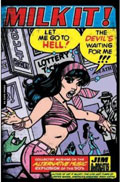 But that is because he loves this music
and doesn't accept the received wisdom. The music should stand on its
own merits. And not liking Sgt Pepper's doesn't mean you don't love
the Beatles.
But that is because he loves this music
and doesn't accept the received wisdom. The music should stand on its
own merits. And not liking Sgt Pepper's doesn't mean you don't love
the Beatles.
And his new book with Kot, The Beatles
Vs the Rolling Stones (reviewed here), takes the form of a free-flowing discussion
about the relative merits of these two important, but not infallible,
bands.
“Were not there to have our views
confirmed,” he laughs. “We are there to have a conversation about
this art.”
It looks like an eavesdropping
transcript of your conversations, but was there some considerable
editing and fact-checking?
Well, we do the radio show – we do
podcasts and we have a couple of listeners from New Zealand telling
us we are wrong or adding their two cents – so we are used to the
back and forth, and that isn't unique.
People who love music, what do they do?
They sit on the couch in their basement and play friends records that
he or she can't live without and are eager to turn them on to. This
is how people interact with music.
We are two lifelong fans who love [the
Beatles and the Stones] but we had fairly organised topics in
advance, like, 'Let's tackle the White Album Vs Exile on Main Street
on Friday' and the two of us would talk and transcribe it . . . and
there it was.
As people who have covered rock'n'roll
for 20 years or more you have to deal with the Beatle and the Stones, so the two of us had 20 or 30 Beatle books and the same number of
Stones books. We went out and bought some more and re-watched Gimme
Shelter and Yellow Submarine for the 20th time and prepped
in that way.
 I wasn't there -- I was born the year
the Beatles came to America and Kot is a little bit older – but one
of the things we hate as critics is the perceived wisdom and the
canon.
I wasn't there -- I was born the year
the Beatles came to America and Kot is a little bit older – but one
of the things we hate as critics is the perceived wisdom and the
canon.
Not that the Beatles and the Stones aren't great bands, but
they shouldn't just be carved into stone on Mt Rushmore: Jagger,
Richards, McCartney and Lennon in place of the four American
presidents.
When that happens young people are
deprived of the joy of discovering this music for themselves and it
is just accepted that these guys are brilliant and 'this is the best
album'. But it's all up for grabs, and Beatles fans can have
conversations with each other like, 'What is the real masterpiece?'
and it's not Sgt Peppers, but is it Rubber Soul or is it Revolver?
People who love this music have these
discussions, and to come at it in that playful way hopefully
entertains people like you who have lived your life with these groups
and also people who don't want another hardcover collection of the
perceived wisdom.
The music should be alive.
Both of these bands occasionally
created some shit . . . and this is a simple sentence that never gets said.
That is part of what happens when you put it in a museum case instead
of treating it as music that is vital.
What I liked is that you went back to
essentials and put this music back into the period. I was born in
Scotland and grew up in New Zealand during this period and there was
you as a teenager in New Jersey, yet we both know so much about
Liverpool and Swinging London by assimilation and over the years.
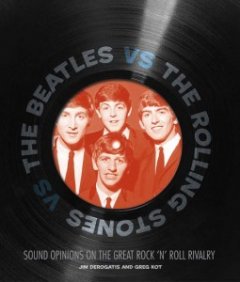 Absolutely. Greg and I are both
students of rock history and it helps to put it in its context and
know where it is coming from. But at the same time one of the things
I hate as a critic is when someone turns to you and says, 'Well, you
really had to be there.'
Absolutely. Greg and I are both
students of rock history and it helps to put it in its context and
know where it is coming from. But at the same time one of the things
I hate as a critic is when someone turns to you and says, 'Well, you
really had to be there.'
That is nonsense. If it is brilliant art
some 14-year old can discover it today in 2011 and still hear what is
genius about it.
A student of music and history and
sociology . . . yes it helps to know all this stuff – and then to
forget it and just listen to it again.
I lecture in contemporary music and the
students were probably born around the time Nevermind came out –
but you can play them early Bob Dylan and they are riveted, they have
never or rarely heard that sound of one man with an acoustic guitar.
Right. We were doing a three-part series on
Dylan in honour of him turning 70 and one of the points we were
trying to make was you can hear Blowing in the Wind and go, 'Yeah
yeah'. But I don't blame kids for being turned off by that.
Clinton Heylin, who is a wonderful
Dylan scholar, points out that it's really a crappy song. On the
other hand if you listen to Masters of War it is as relevant today as
it was in '66 or whenever.
When stuff is accepted as canon it
ceases to be alive. Many people think they know Dylan and they don't.
Or they think they know the Beatles and the Stones and they don't . .
. but have they heard Hey Bulldog? So don't think the Beatles you
know were just I Want To Hold Your Hand.
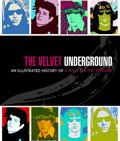 One of the other things I like about the book –
and we might mention the Velvet Underground book in this context too
– is that your publishers serve you well in terms of the great
photos they source.
One of the other things I like about the book –
and we might mention the Velvet Underground book in this context too
– is that your publishers serve you well in terms of the great
photos they source.
I can't take any credit for that! Voyageur Press in Minneapolis has done a great series of hardcover
books on classic rock bands and their approach has been to go to a
critic and have him or her be the primary editor and have essays on
each of the albums.
They came to me to do the Velvets book
and I kinda winced, and so did Greg and I when they approached us to
do the Beatles/Stones book. Because we are scholars of rock
literature and lovers of rock'n'roll we thought, do we need another
Beatles/Stones book? But what sets their projects apart are these
treasure troves of art. They came up with literally dozens and dozen
of photos neither of us had seen before.
Like you, I have dozens of books on
these bands and yet I look at these images and they are actually
important photos. It is that contextualisation again. The thing I found fascinating about the Velvet Underground book was that some of their
posters were very hippie/San Francisco in design. I'd never knew that
sort of art existed about the Velvet Underground.
Yeah. I covered some of that territory
in one of my other books. I had written a history of psychedelic rock
called Turn on Your Mind: Four Decades of Psychedelic Rock from the
Sixties to the new millennium.
Because the Velvets have become so
hugely influential – and again as you were saying about the
Beatles and the Stones – we tend to take them out of their context.
But this was very much in line with the great psychedelia that was
being made – and I don't just mean San Francisco, I mean stuff like 13th
Floor Elevators, the Pink Floyd's first two albums, Revolver and Pet
Sounds.
Pet Sounds and the Velvet Underground?
Well, listen to [the Velvets'] Sunday Morning.
The Velvets twist on it just happened
to be bad trip psychedelia. You could journey towards the white light
. . . or you could go in the other direction. And their's was the
street awareness and cynicism.
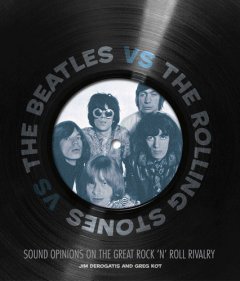 It's very similar to the way the Stones
did psychedelia. When they did Satanic Majesties it was with a giant
sneer. The Hells Angels took acid provided by Ken Kesey and they
didn't start handing out daisies, so there is that other side which
is staring onto the abyss in the psychedelic experience and I think
that's the Velvets' accomplishment.
It's very similar to the way the Stones
did psychedelia. When they did Satanic Majesties it was with a giant
sneer. The Hells Angels took acid provided by Ken Kesey and they
didn't start handing out daisies, so there is that other side which
is staring onto the abyss in the psychedelic experience and I think
that's the Velvets' accomplishment.
I've never defined psychedelic rock as
being strictly made by people taking psychedelic drugs. Some tended
to use the recording studio to transport listeners to a place which
only exists in the space between their headphones. In the Velvets
case it could be a dark place like Sister Ray or European Son, in the
Beatles case it was a much sunnier place like Revolver, except on
Lennon's Tomorrow Never Knows.
I think there are similarities there.
The Velvets were more raw and primitive, but it was still that desire
to create a different sonic universe.
A couple of years ago I was asked to
write the liner notes to three double CDs of New Zealand psychedelic
music and was obliged to point out that at the time in the mid to late Sixties we didn't have
the drugs, so it was people imagining what the psychedelic experience
was like and using the studio as best they could.
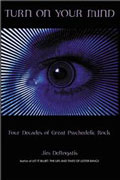 Yeah, the technology was part of it,
multi-tracking recording – and the opening of boundaries. Like
Brian Jones, never played a sitar but went, 'I think that's what this
song Paint It Black needs' so he picked it up, played it, then never
played it again.
Yeah, the technology was part of it,
multi-tracking recording – and the opening of boundaries. Like
Brian Jones, never played a sitar but went, 'I think that's what this
song Paint It Black needs' so he picked it up, played it, then never
played it again.
It was incorporating world rhythms, it
was using imagination, it was channeling your idea of what
psychedelia was. There was this codified set of sonic clues which
said 'psychedelic' but that's as old as mankind itself. What is it
about tribal trance rhythms in Africa, what is it about the gamelan?
The idea of trance and drone and certain music conjuring a mystical
experience. What was one of Aphex Twin's biggest hits? It had a
didgeridoo on it.
Let's come back from the cosmos to the
more mundane. You mention Bill Wyman's Stone Alone
book favorably. I've always thought that was one of the great music
books but rock people want to hear about the drugs and the
excitement. But the mundanity of that book was perhaps more
insightful than any Keith Richards bio.
Absolutely, the day-by-day,
pound-by-pound, bird-I-shagged account is unparalleled in rock
history and I'm really disappointed he never did further volumes. All
the rest is mythologised but Wyman with his accountant's ledger is
brilliant in a way.
I think for the same reason Mark
Lewisohn's Beatles in the studio log book is wonderful. You get a
sense of, 'Geez, these guys recorded these three incredible and
timeless songs and then they went and had lunch and then did four
more!' Holy cow!
That was the idea of the timeline in
the books where you could see these intense periods of creativity
where you'd have the Stones recording Satisfaction and two days later
the Beatle are doing whatever, all in the context of some sublime or
ridiculous cultural touchstone like a James Bond film, or Robert
Kennedy's assassination. It helps to put it back in context.
It's fun and interesting – but at the end of the day let's go to the records and listen with fresh ears. And can we do that when the Beatles are a show in Las Vegas and in Nike commercials, and the Rolling Stone are US$350 a ticket for the current tour? Can we possible regain the excitement of those early records.
I say yes, but it gets harder.
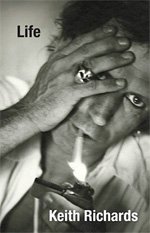 We had just finished the Beatles/Stones
book when the Keith Richards' book came out and I just couldn't be
bothered reading it. I knew what it was going to be like. I
understand there are some really nice passages where he talks about
falling in love with music, on the other hand Altamont is dealt with
in a paragraph? Really?
We had just finished the Beatles/Stones
book when the Keith Richards' book came out and I just couldn't be
bothered reading it. I knew what it was going to be like. I
understand there are some really nice passages where he talks about
falling in love with music, on the other hand Altamont is dealt with
in a paragraph? Really?
I enjoyed the intelligent discussion
about drummers, Charlie Watts and Ringo Starr. You are a drummer,
right?
I am. I think both of those drummer are
often derided for their simplicity. I came up with punk rock so for
me it's Marky Ramone as far as my abilities, but really that's all
you need. So when people say that Watts, and Ringo especially,
weren't Billy Cobham or Ginger Baker. Oh yeah? Then you sit down and
try to play [the Beatles'] Rain and tell me again how simple Ringo
was. And they are sublimely tasteful. They are underrated.
On a tangent: I see there is a box set
of [the Beach Boy's unfinished album] Smile coming out. Can you get excited about that? My feeling is
I'm a bit tired of all the recycling.
I'm not a fan of that stuff, not a fan
of the Past Masters, the Beatles box set and the Anthology. It's
never the stuff I want to hear. I'd love to hear the 13 alternate
takes of Tomorrow Never Knows. I think the albums were crafted for
the most part as a statement that 'this our best at this point' and the
rest feels tedious to me. I feel that about everything.
There's that Velvets box set of live
recordings Robert Quine put together. Don't get me wrong, the VU
collection is pretty essential being the kind of lost album in
between, but later the quality drops quickly. So I'm not a super
geek. People think I have 500 Velvet bootlegs.
Well no, I still haven't plumbed the depths of Sister Ray, I will be listening to that for the rest of my life and may still never get it.
The Beatles Vs The Rolling Stones: Sound Opinions on the Great Rock'n'Roll Rivalry by Jim DeRogatis and Gregg Kot (Voyageur Press, available in New Zealand through Book Reps) NZ$79.99

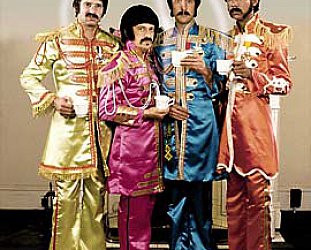
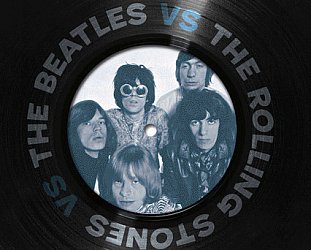
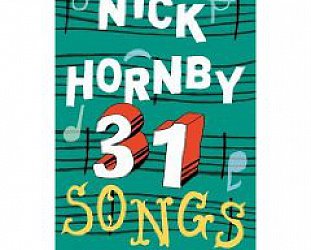



post a comment